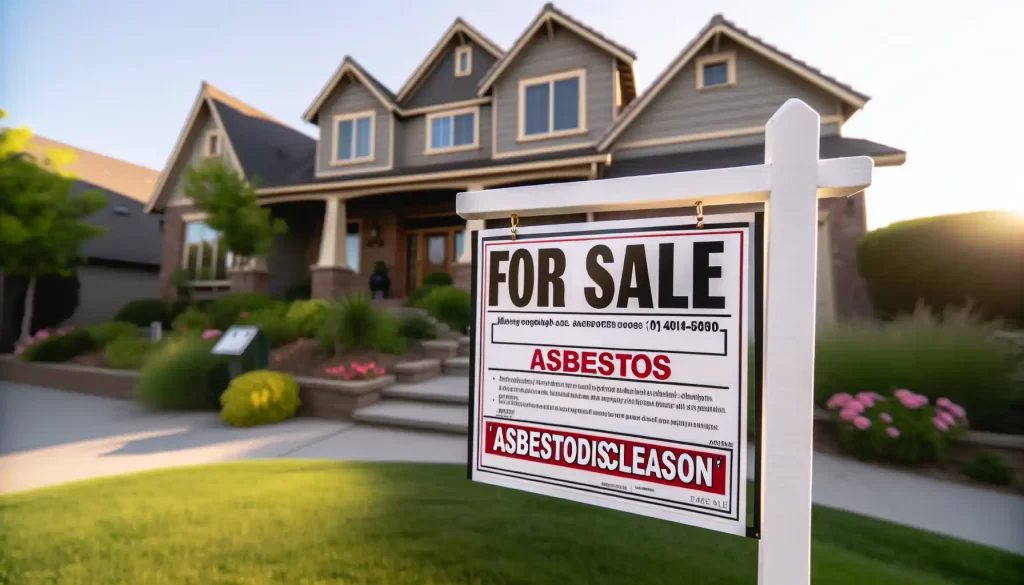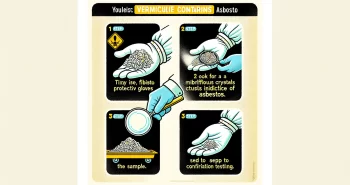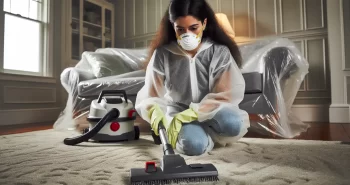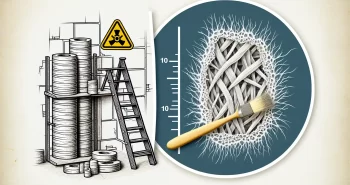Do You Have to Disclose Asbestos When Selling a House? Legal Options

Do you have to disclose asbestos when selling a house? If you are selling a property and asbestos is present or suspected, disclosure laws can directly affect your legal risk and liability. This page explains seller disclosure requirements, buyer rights, and when failure to disclose asbestos can lead to lawsuits or financial penalties. The focus is on legal obligations, not medical advice.
Asbestos Rules by State
When it comes to playing nice with the law, it’s wise to be well-versed in your state’s asbestos game plan. Places like Ohio? Yup, they’ve got rules too. These rules insist you spill the beans about any lurking asbestos. It’s more than just ticking a box; it’s about keeping future owners safe and sound and staying in the law’s good graces. Don’t want to end up in a pickle with legal troubles or tank a deal? Know your state’s asbestos talk requirements inside out.
What If You Keep Quiet About Asbestos?
Zip your lips about asbestos, and you’re asking for headaches. The law might come knocking with fines, or worse, lawsuits. Ignoring this can also lead to buyer drama – and believe me, no one wants to be in the middle of that mess. Keeping your cards close with no asbestos talk might hit you in the wallet or tarnish your name. So, it’s best to lay all your asbestos cards on the table and make sure everyone’s on the same page.
How Asbestos Disclosure Affects Buyer Decisions and Liability
Picture this: you’ve walked into your dream house, only to find there’s a pesky asbestos party going on in the attic. Yikes, right? Buyers deserve a heads-up about any asbestos guests in your home before they sign on the dotted line. This isn’t just about them getting cold feet; it’s about health risks, too. Showing your cards early on means you’re on their team, and winning trust can make the house hunting journey smoother altogether.
Being upfront about asbestos is more than checking off a compliance list – it’s just the right thing to do. You’ll sleep better knowing you’ve done everything by the book and potential buyers can make informed choices, feeling they’ve got a handle on things. Want to peel back the curtain even more on asbestos? Check out how long does asbestos stay in the air? or peek at how much does asbestos removal cost?.
Table of Contents:
What Asbestos Means for Sellers and Legal Disclosure
Hey, if you’ve ever been in the scary situation where asbestos exposure knocked on your door, there’s a bunch of stuff you should know. Asbestos is a regulated building material commonly found in older homes that can create legal disclosure obligations during a property sale. It’s this teeny-tiny mineral made up of strong little fibers that can withstand heat like a champ. Back in the day, folks slapped it into almost everything – roofs, floors, walls – you name it, especially before the 1980s.
Now, why all the fuss? Those fibers are sneaky health villains. Breathing them in over time can saddle you with some nasty conditions: lung cancer, asbestosis (pretty much a lung buzzkill), and mesothelioma, a kind of cancer that doesn’t play nice. Imagine those fibers like a ninja army, quietly storming your lungs and wreaking havoc.
Any time asbestos-packed stuff gets messed with, it’s like releasing a swarm of those ninja fibers into the air. You breathe them in, they hang out in your lungs, and bam, you’ve got inflammation, scarring, and maybe worse. Even scarier, it takes years to figure out what’s happened. So catching this stuff early is a lifesaver.
That’s why sniffing out and handling asbestos in homes is big-time important. You can’t just eyeball your place and say, “looks good to me.” You’d need pros to run tests because those fibers are too tiny to see without fancy equipment.
Knowing what you’re dealing with means you can take control of the situation. If asbestos exposure is discovered after a sale, affected parties may pursue legal claims against responsible sellers or property owners. There could be options to get some form of compensation, too. Having legal and medical pros in your corner can make the world of difference in juggling the mess that is asbestos.
Need to dig deeper? Check out resources on asbestos testing costs, asbestos removal procedures, and your legal rights and claims. Arm yourself with info, protect your health, and seek the help you deserve. After all, knowledge is your best defense against the menace of asbestos.
Can You Sell a House with Asbestos?
When you’re thinking about selling a house that’s got asbestos lurking around, it’s wise to get clued-up on what you can and can’t do, and how it might mess with the home’s price tag.
Is It Legal to Sell a House with Asbestos?
Yep, you can totally sell a house with asbestos in it. But, in lots of states across the US of A, you’ve got to spill the beans about that asbestos situation to the folks eyeing your property. Most house deals will make a big fuss about this in the paperwork you sign, making sure everything’s above board.
And let’s not forget those title insurance folks who’ve got your back in the deal. They’re there to cover any mix-ups with the paperwork, especially if a seller skipped mentioning asbestos. While they won’t promise a spotless title, they keep you covered if there are slip-ups regarding asbestos.
How Asbestos Affects Property Value
Having asbestos tangled up in your home can give your home value a bit of a knock on the noggin. Whether you want to sort out the asbestos mess before selling or just hand the keys over with it as-is, it’s smart to be upfront in all the sale papers. When potential buyers know the score, they’re not caught off guard by any nasty surprises.
Teaming up with real estate experts who are savvy about asbestos, like folks at Cream City Home Buyers, can make unloading a house with asbestos less of a song and dance. Sure, scrubbing out that asbestos ain’t cheap and could drag out the sale for a bit, but tidying it up could make your pad stand out more and nab you better offers.
If asbestos is just hanging out, not causing a fuss, and staying in one piece, it’s not usually a huge problem right then and there. Sellers might choose to keep it as is, but you gotta give a heads-up about it when putting the house on the market. Keeping things transparent helps any potential buyers make the best choice on whether they’re up for dealing with a house that’s got a bit of asbestos.
Keep the legal stuff in check, spill the beans where you should, and weigh up how it’ll hit the price, and you’ve got a game plan for selling a house with asbestos. Doing it with a bit of savvy and honesty can smooth the whole process out nicely.
Do You Have to Disclose Asbestos When Selling a House?
Selling a house means playing the honest game, and asbestos is not one of those secrets you want to keep tucked away. This section dives into what it takes to spill the beans about asbestos when putting your house on the market, from state laws to potential consequences if you don’t come clean and how buyers might react when they catch wind of this sneaky intruder.
Asbestos Disclosure Laws by State
The rules about fessing up to asbestos differ from state to state. Take Ohio, for example — there, you gotta let folks know if your house is harboring asbestos. These laws are your friend, making sure everyone stays safe and sellers don’t get their reputations dented. To get the scoop on what’s needed in your neck of the woods, check in with local real estate experts or your friendly neighborhood lawyer.
What Happens If You Fail to Disclose Asbestos?
If you decide to ignore the asbestos in the closet and skip disclosure, watch out — things can get hairy. Failing to say a word about asbestos might land you in legal hot water and possibly drain your wallet with fines. Even though the feds have their eyes on this with laws like the Residential Lead-Based Paint Hazard Reduction Act (yep, asbestos counts if your house was built before 1981), states have their specific laws too that can give you a real headache if not followed.
How Buyers React to Asbestos in a Home
Potential buyers stumble upon asbestos? Reactions are mixed. While some might peace out without a second glance due to worries over health and removal costs, others could stick around, bargaining for a better deal to cover the clean-up expenses. Being upfront about asbestos not only helps you dodge regret later but also builds trust, making the house-selling dance a lot less awkward.
Disclosing asbestos isn’t just about following the law, it’s about giving buyers all the facts so they can make smart choices. Tick off that disclosure to protect everyone involved and keep things ethical. By staying on the up-and-up about asbestos, you’re not only keeping yourself in the clear legally but making the whole buying and selling shebang a little less bumpy for everyone.
How to Tackle Asbestos Before Selling
When you’re thinking about putting your home on the market and know there’s asbestos lurking somewhere, it’s time to play it smart before you put up that “For Sale” sign. Taking charge of the asbestos situation is key—not just for sticking to the rules but also to keep everyone safe. Here’s the lowdown on what to consider.
Should You Remove Asbestos Before Listing?
Trying to figure out whether to yank out that asbestos? It boils down to a few things. If you’re planning to do any major fix-ups or tear-downs, getting rid of asbestos is the way to go—no one needs a health scare down the line. Plus, once it’s gone, you can breathe easy knowing the future owners won’t have to deal with the mess.
Using Inspection Reports to Support Legal Disclosure
So, you suspect some sneaky asbestos hiding out in your house? Time to call in the pros! Having certified folks come in to do a thorough check-up can reveal what’s what. On average, you’re looking at about $493 for a pro asbestos test, though the price tag could swing depending on how deep they need to dig.
Selling ‘As-Is’ vs. Full Disclosure
When you’re ready to sell a home with asbestos, you’ve got a pretty important decision: do you come clean from the get-go or go the ‘as-is’ route? Laying it all out in the open might stir up some waves and mess with your sale strategy a bit. But being upfront with all the asbestos deets can earn you some big trust points with buyers and keep any legal nasties at bay.
On the flip side, hawking the place ‘as-is’ might catch the eye of those cash buyers looking for a fixer-upper or a deal. They might not blink at rolling up their sleeves to deal with the asbestos, even though it might mean you don’t score top dollar.
Handling asbestos before selling your pad takes some good planning, following the regs, and keeping things real with buyers. Deal with the asbestos drama early on, and you’ll save yourself a lot of hassle, dodging risks and making sure the handover is smooth sailing for everyone involved.
Legal Consequences of Not Disclosing Asbestos
When it comes to buying and selling homes, uncovering asbestos in a property can stir up quite a storm, especially if the seller keeps mum about it.
Can Buyers Sue for Undisclosed Asbestos?
If sellers skip mentioning known asbestos, they’re opening themselves up to some pretty hefty financial troubles. Buyers can take them to court for not spilling the beans during the sale. This oversight might mean shelling out big bucks in fines, getting tangled in lawsuits, and even watching the property’s worth take a nosedive. Sellers really need to lay it all out there to dodge these messy legal headaches.
How Courts Handle Asbestos Real Estate Lawsuits
Judges don’t mess around with asbestos disputes. Not fessing up about it can drag sellers into court conflicts that hit them hard in the wallet. Rules about asbestos disclosures in home sales are strict, even varying from one state to another. Like in Massachusetts, they don’t play—those regulations are tough, and sellers better stick to them to keep from squabbling in court and ensure everyone walks away happy.
How to Protect Yourself Legally When Selling
To dodge legal bullets when you’re offloading a property with asbestos, you gotta be upfront. Spill the truth about any asbestos lurking in the house to keep away from real estate asbestos lawsuits and fines. Sometimes you might need to fix it (encapsulate) or just get rid of it, depending on how bad it is. The guidelines around asbestos disclosures keep getting tighter, so it’s super important to keep things crystal clear if you wanna stay out of hot water down the line. Sellers gotta know what’s expected of them about asbestos, so they don’t have legal wolves at their door during the sale.
Legal Options After Undisclosed Asbestos Exposure
You’ve stumbled upon the not-so-welcome guest in some older homes—yep, asbestos. Dusty fibers floating around, like uninvited guests to a party, can rain on anyone’s parade. So if that sounds like your current living situation, let’s see what steps you should take to keep your health in check and maybe even put a few bucks in your pocket if things get hairy.
When Undisclosed Asbestos Can Lead to Legal Claims
Now, asbestos exposure isn’t something to sneeze at. Breathing in these tiny fibers can lead to some nasty health stuff down the road. We’re talking things like lung cancer, asbestosis—basically, your lungs’ worst nightmare—and mesothelioma. Catching these early is key, so watch out for stuff like a nagging cough that won’t quit, chest pain that won’t ease up, struggling to catch your breath, or weight dropping off without trying. If you’ve had a brush with asbestos in your day, getting regular health check-ins isn’t just smart, it’s necessary.
Legal Rights for Homeowners and Buyers
So, you find out your dwelling has embraced asbestos, it’s possible you’ve got a case on your hands. Those who’ve been caught up with asbestos in their living space might be in the running to claim a showdown for damages. The legal scene can be a wild ride, so linking up with seasoned asbestos attorneys can make sure you know your rights like the back of your hand. Different areas may have their own spins on this, so what plays in one place might not in another. Your rights can hinge on how long you were exposed and how much of a hit your health has taken.
Filing a Claim for Asbestos Compensation
Let’s say the asbestos dust-up has taken a toll—medical bills piling up, you’re missing out on work and your peace of mind’s been hijacked—it’s time to think about filing for some compensation. This is your shot at getting financial help to cover medical costs, lost earnings, and the general misery it’s caused. Partnering with lawyers skilled in asbestos cases can make wading through the legal jungle less of a headache, putting you on track to get what’s fair for the trouble asbestos brought into your life.
Get checked out by doctors and sit down with a legal expert if asbestos decided to make a house call in your life. Spotting signs early, understanding your rights, and pushing for compensation could be your ticket to a safer, more settled future. For more deets on dealing with asbestos-related curveballs, from testing to court dealings, check out the rest of this guide.










